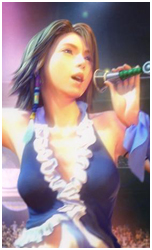
Final Fantasy is my favorite series of games. With a perfect
mix of action and storytelling, the Final Fantasy series has become my warm
blanket when I think the gaming world has passed me by. What makes the Final
Fantasy series so great has been its ability to incorporate role-playing gameplay,
with character driven stories, in often beautiful drawn environments,
accompanied by stunning sounds. While I have been disappointed on occasion, I
always admire the effort and the designers commitment to excellence in each
outing. Well, almost every outing.
I’ve loved the series so much I even named my dog, Tidus,
after one of the games heroes. Actually, I’m not a Tidus fan, but I do like the
name. Spawning 13 titles, countless spin-offs from the great, (Final Fantasy Tactics) to the awful (Dirge of the Cerebus) and way too much
fan-fiction, Final Fantasy is embedded as one of the most popular game series
in the world.
In that vein and in honor of the Game Boy Advance
re-release of my favorite game, Final
Fantasy VI, I wanted to put together a look back at the main titles for what
is one of gaming’s most prolific franchises.
Final Fantasy (NES) (
“When the word is in darkness,
four warriors will come…"
The one that started it all.
A simple introduction, no storyline and a four person
party chosen from six classes (Fighter, Black Belt, Thief, White Mage, Black
Mage, Red Mage) with names in four characters or less. In 1990, my life
changed.
It’s tough to pinpoint what made this game so great for
me. Maybe it was the sense of freedom in creating my own party. Or maybe how
the game felt so non-linear, while being straight as an arrow. Maybe it was knowing
that in most cases, the next battle could be my last and that if I lost, I
would have wasted an hour of my life.
I do know what I didn’t love, saving for the silver sword
in Elfland. Ask anyone who remembers playing Final Fantasy and at some point
they’ll mention the hours saving up for that thing.
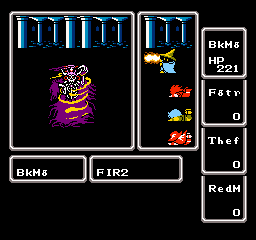
But the moment that sticks out, the moment that hooked me
is the credit sequence after completing the Prologue, with the classic Final
Fantasy score. Just breathtaking for an 8-bit game.
Nonetheless, what was rumored to be the last game of
Square, which was facing bankruptcy at the time, and what was supposed to be
director Hironobu Sakaguchi’s final game, thus dubbed Final Fantasy, turned
out to be the beginning of a legendary franchise.
Final Fantasy II
(NES) (
One thing you can’t say about Final Fantasy games is that
they are stale, (well that was until X-2 was shat upon the public). Seeing how Final Fantasy I was a large part in
saving Square, you’d figure that they go back to the well for the second outing.
Wrong.
Completely changing their formula, the sequel had nothing
to do with the Light Warriors of Final
Fantasy I. Even more ballsy was that the designers completely revamped the character
system, forcing players to play with four named characters, without any job
distinctions and, lo-and-behold, a story about an empire and rebels, with twist
turns and some unresolved questions about the heroes as the game closes. (This will
become the Final Fantasy staple storyline.)
While the storyline is thought-out and the game plays
pretty well, Final Fantasy II has a not so pleasant legacy. It’s the game known
for the series most exploitable glitch. In its efforts to “mix-it-up” the
designers decided to have the characters raise stats, abilities and
proficiencies, by their conduct in battle. Use a spell, become better at
spellcasting. Lose hit points and survive, gain more hit points, etc. What
happened is that people soon realized that if they beat up their own party,
they could raise their attributes almost instantly. Players could end up with
god-like characters before the Prologue was complete.
I guess at this point I need to explain the time gaps. The
quick version is this, seeing the success of Final Fantasy I in the
localization for the
SNES was being unveiled and so Square decided to abandon Final Fantasy II and translate their current release Final Fantasy IV for
version was unreleased in the
Playstation in 2003. Whew.
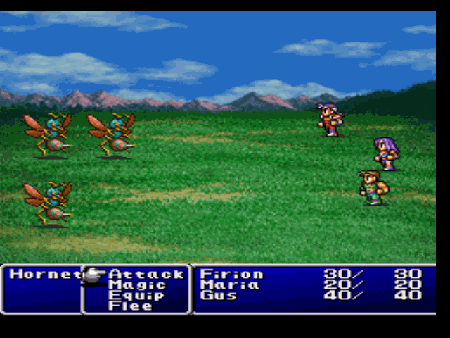
Final Fantasy III
(NES) (
What is always interesting about the Final Fantasy series
are the constant adjustments. As I mentioned above, with each game everything
changes, but that’s not it. What makes me love the series so much is that the
designers are going for perfection with each edition (but for X-2, again).
Known for years in the
due to the fact it wasn’t released until last year, the game is a bit of a
reversion to Final Fantasy I, with its lack of character storyline, classic
leveling-up and job selection. This game’s place in the Final Fantasy history
is the introduction of the “jobs-system.” The system that allows players to
change the job (warrior, black mage, dragoon, etc.) of the character over the
course of the game. It is a system, which the designers struggle to work with
for most of the series history.
Other than the jobs-system, there isn’t too much that is
remarkable about this edition, which was the third Final Fantasy title in 2
years and the last NES port. It’s a passable fun game, but at its heart the DS
remake is disappointing. (Just watch this make some 2007 best-of lists). [Ian note: Read Jon’s full review of the DS remake right here.]
Final Fantasy IV
(SNES) (
When people debate the greatest console games, if such a
thing actually happens, this game must make the conversation. The game offers difficult,
but fair gameplay and has one of gaming’s greatest musical scores. While
players do not pick the character’s job class, most job classes from the previous
entries are represented through the game various playable characters, thus
giving the player the chance to play many of the job classes usually eschewed,
like a bard, the Aquaman of Final Fantasy jobs. Spoony-bard.
Reverting to a character-driven plot, what made this game
a masterpiece is its storyline. Final
Fantasy IV is a game about redemption. However, you don’t realize whose
redemption it is about until the very end. It is one of the most fulfilling
experiences for any gamer.
What is more amazing, the GBA remake actually adds to the
game. A truly perfect game.
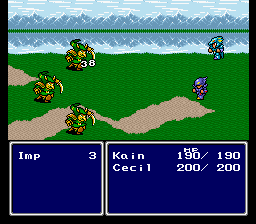
Final Fantasy V
(SNES) (
What can be best described as a nice attempt, Final Fantasy V tried to take the best
parts of its predecessors and attempted to create an ultra-Final Fantasy.
Barrowing plot elements from Final
Fantasy II and IV and using III’s job-system, what resulted is a
mishmash of boring plot, uninteresting characters, lame score, cumbersome
job-system and some of the worst translated dialogue of any of the games. For
an example see the pirate dialogue, all of it.
The game was not originally translated for
lack of translation due to the “non-accessibility” of the game to the average
gamer, which in normal-speak means the game’s “turdiness.” It wasn’t until the
groundswell of Final Fantasy popularity after the release of Final Fantasy VII that Sony decided to
remake this title along with most of the previous titles.
SPOILER: As a plus, the game did feature the first use of a in-game
permanent character death. As a minus, no one cared.
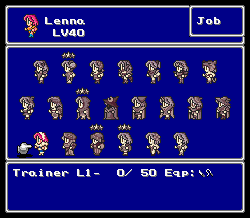
Final Fantasy VI
(SNES) (
As I mentioned before this is by far my favorite game.
Featuring 14 playable characters, some of which are purely optional, an amazing
score, unbelievable graphics for its time, an expansive storyline and more well
utilized plot twists than I can ever remember in an RPG, Final Fantasy VI was by far the series most expansive undertaking.
What made the option of 14 playable characters amazing was
the fact that each one (save the optional characters) had a well developed
storyline. Also having 14 character solved the constant Final Fantasy struggle
between having players select their party’s job-classes and being able to
develop the characters in the storyline. On top of that, the game found a way,
like Final Fantasy IV, for the player
to utilize all of the 14 characters. For its time it was the most adventurous
RPG out there in the console world.
The game also provided some the series most memorable
scenes, from the Opera, to the summit with Gestahl, to the loneliness of the
World of Ruin, the game still is the pinnacle of epic videogame storytelling.
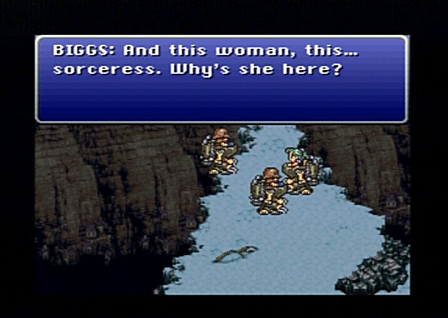
On a gameplay note, what made this installment that much
more fun was the lack of level grinding. In order to move its giant story
along, the designers eased up on the difficulty and allowed the player to play
the game straight through without having to stop and build levels. The player
still had to fight the normal course of random encounters, but no longer was
there the need to grind in between dungeons. While some argued that it caused
the game to not be as challenging as previous editions, the game was fair and
offered the perfect balance between story and action.
On a down note, the game did contain a turbo-glitch, which
let players with a turbo controller to leave the game on overnight and raise
levels.
Final Fantasy VII
(PS-One) (1997)
This breakout hit for the Sony Playstation is the game
that introduced many people to the Final Fantasy series. Standing as the
greatest selling Final Fantasy game, it has spawned numerous spinoff titles in
the non-RPG genre and a few movies.
The game is overrated.
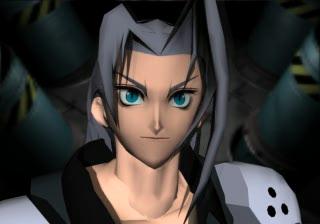
This game begins a series of mostly-blonde, whiny male
protagonists with big swords. What is Cloud compensating for with that thing?
He might as well hop into Peter Griffin’s large red penis-mobile at the end and
drive into the sunset.
The story, in addition, is more linear than previous
efforts and while the introduction of cut scenes makes the game more cinematic,
they are often tedious and demonstrate what has become a curse to the Final
Fantasy series, melodrama.
What is known to many as the signature scene of the game,
Aeris death scene, is one of the most melodramatic, laughable moments in the
series. If you cried during that scene, take down your Kelly Clarkson poster
and put up a Clay Aiken one. I’ll leave it at that.
Also to nitpick, the game’s main bad guy, Sephiroth,
is viewed by many as some sort of gaming bad ass. Really? Really?
With familiar gameplay, a
boring storyline and no real innovation (like I give a shit about 3D), Final Fantasy VII may be the game with
the most sales, but its far from the best entry in the series.
Final Fantasy VIII (PS-One) (1999)
This is the Final Fantasy they
let you play in Hell.
Apparently when going in to
design this game the producers said “let’s take the worst plot elements from
the previous titles, add in an unnecessarly difficult and annoying battle
system and not improve the graphics or the score whatsoever.”
Well I must admit many did buy
it and while reviews for the game were generous, you don’t see Final Fantasy
VIII pop up on many US best-of lists. Most reviews seem to give the game a pass
because it was a Final Fantasy game, which is kind of bullshit.
The Junction System, which is
the sandpaper toilet tissue of the Final Fantasy series, is cumbersome,
difficult and all-around awful. I hated every second of it and was glad to
never see it again.
But I can’t move on until I
take another shot at the plot. The plot is by far the worst of the series,
(that includes X-2). The game has more melodrama than All My Children during sweeps. How fucking whiny and unlikeable can
a character get? Just look at Squall.
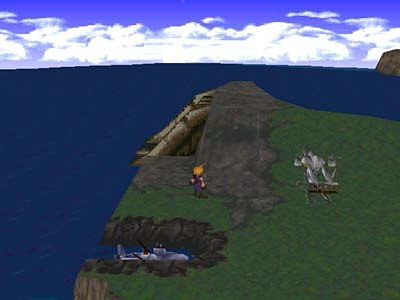
As an excuse, this game was
designed during the ill-fated, and let’s be honest, almost cataclysmic Spirits Within, whose lone redemeing
factor is the unintentional comedy competition between Donald Sutherland and
Alec Baldwin. For those curious, Baldwin wins.
Final Fantasy IX (PS-One) (2000)
I remember being afraid when
this game came out. I didn’t want another disappointment like Final Fantasy VII, let alone another
disaster like Final Fantasy VIII.
Gladly, my fears were unnecesary.
I always look at Final Fantasy IX as a reboot to the
series. Final Fantasy VII, VIII and Spirits Within, which would have been Final Fantasy IX, if they hadn’t made it
into a movie, are tied together in their boring post-modern setting. Set in the
medieval “steam-punk” world like Final
Fantasy’s IV – VI, Final Fantasy IX
sort of pretends VII and VIII didn’t happen, kinda like how Goldeneye pretends the Dalton-era never
existed.
On top of the thematic reboot,
the game reverts to a familiar ability system utilized in many of the previous
editions.
The most interesting aspect of
Final Fantasy IX, because it was the
last published for PS-One, it was supposed to be a salute to the previous
editions. Criticized by some as nostalgic, Final
Fantasy IX is underrated. And while not as well selling as previous
Playstation offerings, the game provided a necessary shift in the series.
As a side note, this game
plants the seed for the annoying mini-games in the Final Fantasy series. While
the mini-games before (Final Fantasy VII)
were fun and non-essential, the card-game included was mandatory. Add in the
fact that the rewards were pretty lame for trying to learn a complicated game,
it was a waste of time. Finally, whiny blonde hero, with a tale.
Final Fantasy X (PS2) (2001)
The first Final Fantasy of the PS2-era has been hailed as
a great entry into the series.
The action and graphics are top-notch as well as the
battle system. With 7 playable characters, which could be interchanged during
battle, a familiar battle system and the introduction of the an easy to learn
sphere grid, Final Fantasy X can’t be
criticized for its gameplay.
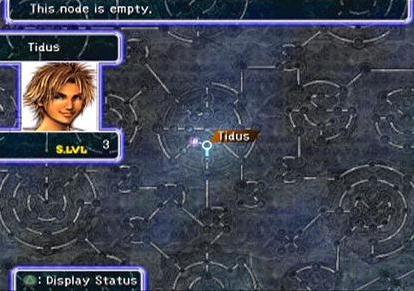
Nonetheless, I’ve never been able to decide what I think
of this game. With the entry of one of the most whiny blonde protagonists in
the series, Tidus, the game is rightly called out for its soapy cut-scenes
between Tidus and makes-me wish-I-were-gay Yuna, the female interest. Blitzball
is nothing short of a degenerative illness. A boring game, that is miserable to
learn, too time consuming to master and does not offer much in return. Why
anyone bothers is beyond me?
The game can get bogged down by side-quests for each party
members ultimate weapon, especially the lightning dodge, which all kinds of
evil.
In the end, it’s a game that if it catches you in the
right mood, you’ll sing its praises and if you are in a different mood, its
overrated.
Final Fantasy X-2
(PS2) (2003)
Regardless of whether Final
Fantasy X is overrated or not, it did not need a sequel. In fact, Final Fantasy X was the least in need of
a sequel. For whatever reason, however (cash), the first direct sequel to a
Final Fantasy game was released in 2003. While garnering great reviews, Final Fantasy X-2 is one of the worst
entries in the series. By this point great reviews for a Final Fantasy title
are obligatory. If the game featured Sammy the blonde haired thief wondering
around the mist continent of Dildo, Famitsu and 1up.com would give it 9.5.
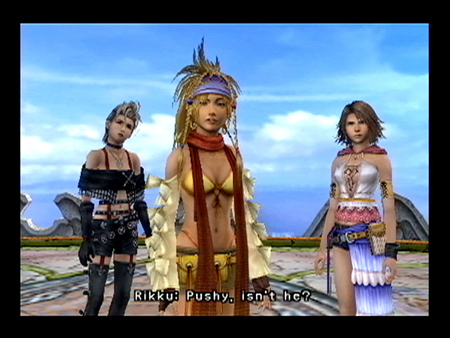
The game follows two of the previous games heroes,
annoying Yuna and the lolita Rikku, with new addition, Paine the butch lesbo, running
around Spira in skimpy outfits trying to collect spheres or something. The game
could have been called the “Stupid Spoiled Whore RPG” and it would have been a
perfect fit. Running on the same engine, using the same graphics and basic
fighting system, with added job-system of dress spheres, Final Fantasy X-2 shows how lazy a developer can be.
As an even worse insult, more mini-games and lame
side-quests were added making the game so non-linear, there is almost no discernable
plot. By the end of the game you hope Sin comes back and destroys the world,
however, he doesn’t. Instead, the player gets what would have been described as
the “cop-out” ending for Final Fantasy X.
What I spoiled it, trust me, I just saved you 35 hours. A complete waste of
time.
Final Fantasy XI (PS2) (
Also known as Final Fantasy Online, it gets included here
only because someone decided that it would be more marketable if it was
included in the Final Fantasy numbers canon. As a MMORPG, Final Fantasy XI
takes the normal MMORPG elements and applies them to the general Final Fantasy
universe.
For MMORPG fans the game has been warmly received and with
three updates and an expansion to the Xbox 360.
Oh in terms of notoriety, kidnapper d’jour Michael Devlin
plays it, so its got that going for it.
Final Fantasy XII
(PS2) (2006)
The latest entry and the last Final Fantasy for PS2.
Development for Final Fantasy XIII for
PS3 began long before XII was debuted,
which always inspires someone go shell out $60. As the most expansive Final
Fantasy yet, the game takes an average of 80 – 100 hours to complete. Jesus.
The game also incorporates many MMORPG elements with its
new battle and Gambit System which allows player to seamlessly move from
exploring to combat. As part of the Gambit System, the player can pre-program
other party members combat options to accommodate the seamless transition.
While innovative, the game can tend to play more like a simulator and has
a feel unlike previous Final Fantasy
titles.
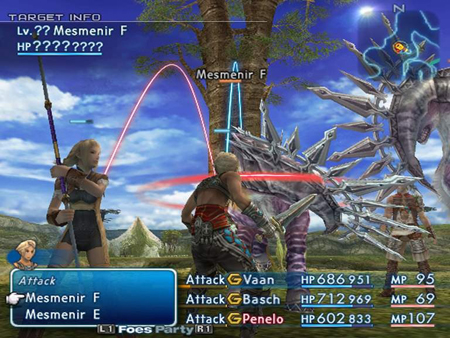
With many hours to fill, the story is twisting and
complicated and the player does not set out onto the main quest until at least
5 hours into the game.
Reviews for the game have been phenomenal, garnering 10
out of 10s from many reviewers. However, the true assessment of a Final Fantasy
game comes with time. Truly not for the casual fan, Final Fantasy XII ,while the latest, it is not the series final
fantasy.
Rankings
Because I like lists here’s my list for the best to worst
Final Fantasy games*:
1.
Final
Fantasy IV
2.
Final
Fantasy VI (still my favorite)
3.
Final
Fantasy IX
4.
Final
Fantasy XII
5.
Final
Fantasy X
6.
Final
Fantasy I
7.
Final
Fantasy VII
8.
Final
Fantasy V
9.
Final
Fantasy III
10. Final Fantasy II
11. Final Fantasy X-2
12. Final Fantasy VIII
*Final Fantasy XI is not included.